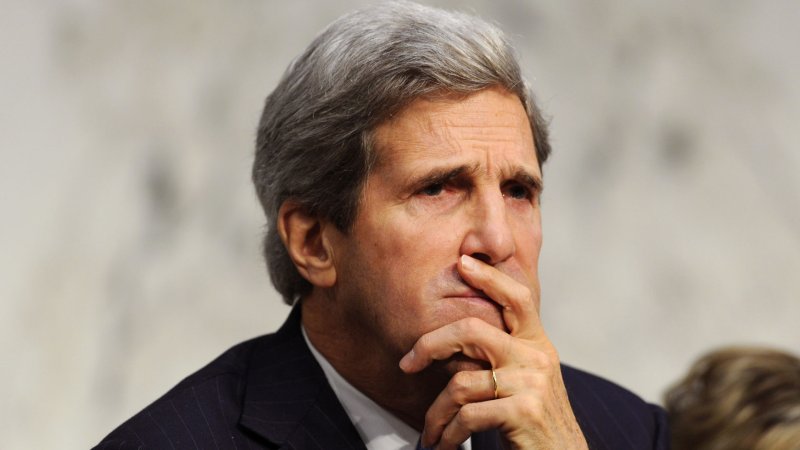1 of 2 | Senate Foreign Relations Committee Chairman John Kerry (D-MA) listens as Deputy Secretary of State William J. Burns and Deputy Secretary of State for Management and Resources Thomas R. Nides testify during a Senate Foreign Relations Committee hearing on the terrorist attacks on the U.S. Embassy in Benghazi, in Washington, DC on December 20, 2012. UPI/Kevin Dietsch |
License Photo
WASHINGTON, Dec. 20 (UPI) -- Congress shares the blame for the attack on a U.S. consulate in Libya that killed Ambassador Chris Stevens and three others, Sen. John Kerry said Thursday.
Kerry, D-Mass., chairman of the Foreign Relations Committee, pointed out the Accountability Review Board report released Tuesday on the attack recommended spending $2.3 billion on security for U.S. embassies and consulates in the next decade.
Stevens, information officer Sean Smith and two security officers, Glen Doherty and Tyrone Woods, both former Navy SEALs, were killed in the Sept. 11 in Benghazi. Four senior State Department officers resigned or were fired Tuesday.
"Congress also bears some responsibility here. Congress has the power of the purse," Kerry said. "We use it for any number of things, but it's our responsibility. And for years, we have asked our State Department to operate with increasingly lesser resources to conduct essential missions. And because of the gridlock and excesses in the Senate and Congress itself, we have not even been able to pursue the regular order of authorizing legislation. That must change, and in the next session of the Congress, I hope it will."
Thomas Nides, deputy secretary of state for management and resources, said the department is re-evaluating security. He said the historic practice of depending on host countries for security does not work in places like Libya where a weak government is dealing with often violent political unrest.
Deputy Secretary of State William Burns also testified. Secretary of State Hillary Clinton, suffering from a stomach virus and the aftermath of a concussion, was absent.
The House Foreign Affairs Committee also held a hearing on the matter Thursday, titled "Benghazi Attack, Part II: The Report of the Accountability Review Board," chaired by Rep. Ileana Ros-Lehtinen, R-Fla.
Ros-Lehtinen said the Accountability Review Board report concluded "failures in leadership and management reached senior levels and resulted in a security posture at the diplomatic compound that was inadequate for Benghazi and grossly inadequate to deal with the attack that took place."
She said the Benghazi attack should not be treated as an isolated incident but as part of "a systematic failure with broad, far broader, and more worrisome implications."
The ranking Democrat on the committee, Rep. Howard Berman of California, noted the ARB report concluded Congress has cut administration funding requests for diplomatic security. He said the result has been diminished security and "a culture at the State Department that is more preoccupied with saving money than with achieving its security goals."
"The repeated rejection of requests for security upgrades at the mission in Benghazi is, some would argue, a manifestation of this culture," he said.
Clinton said in a letter Monday to the heads of both panels she would answer their questions in January.
Burns testified at the House committee hearing the State Department "learned some very hard and painful lessons in Benghazi."
Nides said Clinton has directed his office to implement all 29 recommendations in the ARB report "and to pursue steps above and beyond" the report.
He said the department plans to increase its diplomatic security workforce by 5 percent, with the added personnel deployed to secure "high-threat posts."
The testimony by Burns and Nides comes a day after four State Department officials were removed from their posts after an independent review board criticized "grossly inadequate" security at the U.S. diplomatic compound in Benghazi.
The highest-ranking official, Eric Boswell, head of the Diplomatic Security Bureau, resigned effective immediately, the State Department said late Wednesday. The three others were responsible for other aspects of embassy security and planning for Libya and the Middle East, the department said, without naming them.
They were relieved of their responsibilities and were expected to be reassigned, a senior administration official told The Washington Post.
Two of the three were identified by The New York Times as Charlene Lamb, deputy assistant secretary responsible for embassy security, and Raymond Maxwell, a deputy assistant secretary responsible for North Africa.
The report by the Clinton-appointed review board criticized officials in the Bureau of Diplomatic Security, the State Department's security and law enforcement arm, as having displayed a "lack of proactive leadership."
It also said some officials in the Bureau of Near Eastern Affairs "showed a lack of ownership of Benghazi's security issues."
The report did not criticize more senior officials, including Clinton or Undersecretary of State for Management Patrick F. Kennedy, who has vigorously defended the State Department's Benghazi decision-making before Congress.
Review board Co-chairman retired U.S. Navy Adm. Mike Mullen, a former chairman of the Joint Chiefs of Staff, told reporters Wednesday the board did not find any officials who had "engaged in willful misconduct or knowingly ignored his or her responsibilities."
But he said, "We did conclude that certain State Department bureau-level senior officials in critical levels of authority and responsibility in Washington demonstrated a lack of leadership and management ability appropriate for senior ranks in their responses to security concerns posed by the special mission."















